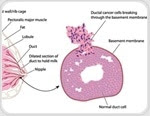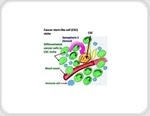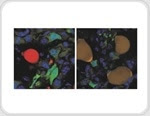| |  According to new research, women are at a highest risk of breast cancer, more than two decades after having given birth. This finding comes along with another in a separate study that reveals that breast cancers occurring after childbirth are more likely to spread compared to breast cancers in women who never had children. According to new research, women are at a highest risk of breast cancer, more than two decades after having given birth. This finding comes along with another in a separate study that reveals that breast cancers occurring after childbirth are more likely to spread compared to breast cancers in women who never had children. | |
|
| |  A study by researchers at University of Colorado Cancer Center and Oregon Health & Science University published today in the Journal of the American Medical Association Network shows that breast cancers diagnosed in young women within 10 years of giving birth are more likely to metastasize, and thus more likely to cause death, than breast cancers in young women who gave birth less recently or not at all. A study by researchers at University of Colorado Cancer Center and Oregon Health & Science University published today in the Journal of the American Medical Association Network shows that breast cancers diagnosed in young women within 10 years of giving birth are more likely to metastasize, and thus more likely to cause death, than breast cancers in young women who gave birth less recently or not at all. | |
|
| | Scientists have created the most comprehensive method yet to predict a woman's risk of breast cancer, according to a study by Cancer Research UK published in Genetics in Medicine. | |
|
| |  A new study has shown that patients with breast cancer may be at an increased risk of developing the heart condition atrial fibrillation (AF). A new study has shown that patients with breast cancer may be at an increased risk of developing the heart condition atrial fibrillation (AF). | |
|
| | Findings from a new study conducted by researchers at Henry Ford Health System suggest a link between keloids and increased risk of being diagnosed with breast cancer, particularly among African Americans | |
|
| | Scientists have identified genetic changes that may predict the likelihood of breast cancer relapse in women taking a common type of hormone therapy. | |
|
| |  Researchers at Kanazawa University report in Proceedings of the National Academy of Sciences of the United States of America that a particular signaling pathway in breast-cancer tumors causes cancer cells to divide symmetrically, expanding the tumor. Inhibiting the pathway by drugs could become a strategy for eliminating the cancer cells. Researchers at Kanazawa University report in Proceedings of the National Academy of Sciences of the United States of America that a particular signaling pathway in breast-cancer tumors causes cancer cells to divide symmetrically, expanding the tumor. Inhibiting the pathway by drugs could become a strategy for eliminating the cancer cells. | |
|
| |  As cancer cells respond to cues in their microenvironment, they can enter a highly plastic state in which they are susceptible to transdifferentiation into a different type of cell. As cancer cells respond to cues in their microenvironment, they can enter a highly plastic state in which they are susceptible to transdifferentiation into a different type of cell. | |









































No hay comentarios:
Publicar un comentario